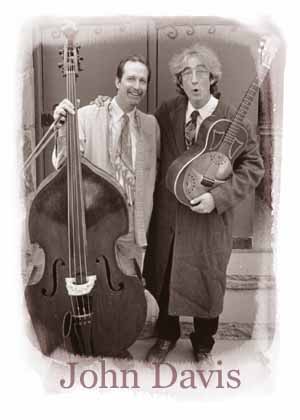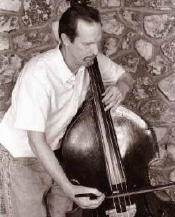 |
||||
 |
 |
 |
 |
|
John Davis
I am the disreputable offspring of Baptists and bootleggers who infest South Georgia. I grew up on a small creek that flows into the St. Marys River, just east of the great Okeefenokee swamp. In between jobs that ranged from being a dock worker in a paper mill to being a craps and 21 dealer in Reno to being a university professor of language and literature, I found time to learn guitar. I learned guitar at around age 12 from one of Gods best experiments in improving the species, Enman Cobb, a South Georgia bluesman. The three most important lessons Enman taught me were my first chord (E9), that there isnt a right or wrong way to play the instrument, and this bit of advice: "Careful, Johnny, you white folks has a tenacee to work the guitar. But you spose to play the guitar. Dont you be working it." I owe him much. I use many E9 chords, I now have some probably "wrong" ways of doing things that I happen to like, and, pardon the contradiction, I work hard to keep a goodly dose of playfulness in my music. My first decent band was called "Two Shades of Soul," the name resulting from my inclusion in an otherwise all-black soul group made up of me and high school buddies. We did the basic Temptations to Otis Redding gamut, stuff that I still love to hear. In college I played with several groups in South Georgia, the most infamous being a band called "Space Gnome". We were infamous for having rock and roll banned from the local university auditorium after we gave a charity concert not knowing that the then president of the place was in the audience. And still unclear as to what most offended him. Was it the off-color lyrics in our original music? The loud amps? Possibly the grand finale, the band doing Louie, Louie while a fellow named Max Sykes blew a slide whistle and beat a long Polish sausage while a 10-piece marching band did "Stars and Stripes Forever"? (Max later went on to achieve some fame in the world of punk) Who knows? It was the 70s, what most people mean when they say, "The 60s." And if you were actually there, you too probably have trouble remembering. The manager and bass player went on to do quite well for themselves in the Nashville scene. The other guitarist got married, had lovely kids, and became a teacher. The drummer did the same. I went off to deal craps and 21 for Harrahs in Reno. | |

|
After a long stint of taking other peoples money, I left for
LA and landed a gig with a former Elvis impersonator, making, sometimes, as
much as $30 a night! Amazing. Even more amazing, probably 50 other guitarists
were lined up, hoping Id die or something so that one of them could inherit
the gig.
Needless to say, I jumped at the chance to audition for a band in Phoenix
that paid something on the order of a living wage. I moved to Arizona and played
lead for the Paul Morris Band for a couple of years.
Paul was a fine C&W
singer/songwriter with a label deal, and consequently I had the opportunity
to do shows with a goodly number of C&W luminaries. My fondest memories
of the whole two-year deal were a) getting to open for Jerry Reed in Gila Bend
b) getting into something approaching a barroom brawl with Gary U.S. Bonds and
c) once mistaking John Anderson for a roadie and sharing the bottle of bourbon
that he had stashed in the back of his Twin Reverb. |
|
Amidst all this fun, one day I left, went back to Georgia, put the guitar under the bed for 10 years, and studied Shakespeare. I thought Id found my niche in life. But grading one too many freshmen essays convinced me otherwise. In the early 90s I began fiddling with acoustic guitars and doing music on my own. I also began to write seriously for the first time. I figured that I couldnt survive the sort of dysfunctional exuberance of another band, so I struck out on my own. By a stroke of great fortune, however, I met Sean Kelly a few years ago, my bassist and good friend, who was, in addition to being an incredible musician, sane and hardworking (rare qualities in musicians of my generation). This rambling narrative has more or less caught up to the present. | |

|
Sean Kelly Growing up in a musical family, Sean received piano lessons at an early age from his mother, an excellent sight reader, and also from his father, a blues pianist who couldn't read a note. This eclectic exposure set the tone for Sean's later musical opportunities: touring with rock bands in the US and Japan and symphony orchestras in the US and Europe. In 1980 Sean earned a Masters in Music from Indiana University where he studied with Murray Grodner, who played under Toscanini in the NBC Orchestra, and Eugene Levinson, principal bassist with the New York Philharmonic. |
|
Sean currently plays bass in the Boulder Philharmonic and is also Staff Piano Technician for Denver University's Lamont School of Music. He lives in Northglenn with his lovely wife, Sandy, and their gifted-yet-rebellious son, Shea. Everett Moran Everett is a past Concert Director and Operations Manager for Swallow Hill Music Association in Denver. Prior to his relocation to Denver, Everett presented a concert series in Oklahoma City, focusing on singer-songwriters and acoustic music, including Ani DiFranco, David Lindley, Bela Fleck & the Fleckones and others. Everett trained as a Second Engineer at Record Plant/LA and under Val Garay at Record One.
| |